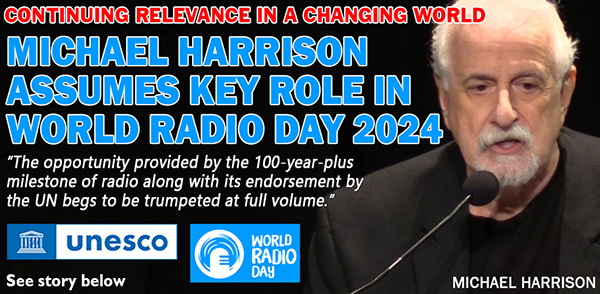TALKERS founder and longtime radio programming pioneer Michael Harrison has been appointed by the United Nations Educational, Scientific and Cultural Organization (UNESCO) to the position of Executive Advisor for the 2024 presentation of World Radio Day (WRD), celebrated each year on February 13.
The theme of the 2024 celebration is Radio: A century informing, entertaining and educating.
Harrison issued the following statement: “In an era marked by the dizzying speed of technological innovation and the rapid obsolescence of one shiny new platform after another, radio is beginning its second century of service as one of the most dependable and widely-utilized forms of media in the world. WRD’s mission in 2024 will be to shine a broad floodlight on radio’s remarkable past, relevant present and promise of a dynamic future. The opportunity provided by the 100-year-plus milestone of radio along with the medium’s endorsement by the United Nations begs to be trumpeted at full volume. I am honored and invigorated at this delicate time in history to be able to participate in helping to celebrate this glorious, iconic medium on a global level.”
UNESCO has posted the following statement: “For many generations, radio has remained the most far reaching, easily accessible communication medium that informs and entertains all sectors of society. While in some regions it has been used to fuel hatred, divisions and conflicts, a lot of progressive legislation and regulatory mechanisms have been passed in many countries resulting in radio that broadcasts balanced news, programs and practices independent journalism in general.”
The statement continues: “Over the years radio practitioners have received training to improve their professionalism and adapt to changing editorial and ethical demands as well as technological developments especially radio’s incorporation into new popular digital platforms. Increasing access to reliable information and reaching audiences in remotest parts of countries in different languages, regardless of literacy levels, have been some of the greatest attributes of radio, still to be surpassed by any other media.”
Every year, UNESCO offers radios stations copyright-free material and suggests some ideas that radio stations could include following the annual themes decided by the WRD Committee, such as special radio shows and audios, open house, broadcast exchanges and increased listener interaction, among others. Harrison will play a key role in facilitating these processes for 2024.
While UNESCO coordinates World Radio Day activities at a global level, UN member countries, through their radio stations and media stakeholders, celebrate the day in a variety of ways they see fit, including offerings of some optional 13 program ideas offered by UNESCO, information, news, audio and video resources every year.
Harrison will be reaching out to radio industry leaders worldwide to, as he says, “Do our best to raise awareness of radio’s ongoing importance and value and help the broader industry achieve that worthy goal, integrating into the new technology and social norms of this remarkable new era.”



